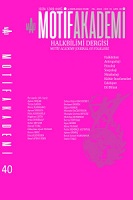BİR YOL ERİNİN ÖZ BİLİNCİ: KENDİ KENDİNE YUNUS
THE SELF-CONSCIOUSNESS OF A ROADMASTER: YUNUS TO YOURSELF
Author(s): Meriç HarmancıSubject(s): Psychology, Turkish Literature, Theory of Literature
Published by: Motif Halk Oyunları Eğitim ve Öğretim Vakfı
Keywords: Yunus Emre; inner speech; pseudonym couplet; meaning; self-consciousness;
Summary/Abstract: The poet expresses himself sometimes directly, sometimes through images and metaphors. The word becomes the interpreter of the heart, heart and mind; thanks to the power of the word, the invisible is made visible. Yunus Emre, who has very limited information about his historical personality, will be guided by his words in order to know, understand and draw his paradigm. In this study, it will be tried to determine how Yunus positioned himself, what he said to himself, what kind of advice he gave, and what his criticisms and expectations were by tracing the traces of his journey reflected in his poems. When Yunus is in conversation with himself, Yunus addresses himself as "Yunus, Yunus Emre, My Yunus Emre, Lazy Yunus, Sinful Yunus, Dervish Yunus, desperate Yunus, Lover Yunus", while being subject-object, calling-speaking. In some of his poems, the projection of an inner conversation and confrontation is reflected in the lines. These calls of Yunus to himself and his conversations with himself in some pseudonymous couplets show his level of consciousness as well as an expression of the mood he is in, the emergence of his subconscious mind and the concise expression of the doctrine he wants to give. In order to reveal Yunus's worldview and his understanding of mysticism, the study aims to deal with what Yunus says as a human being outside the stereotypes of these pseudonyms and address couplets, within the framework of the "ego", "shadow" and "self" archetypes of analytical psychology.
Journal: Motif Akademi Halkbilimi Dergisi
- Issue Year: 15/2022
- Issue No: 40
- Page Range: 1129-1138
- Page Count: 10
- Language: Turkish

